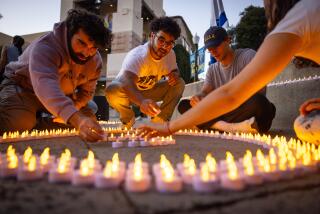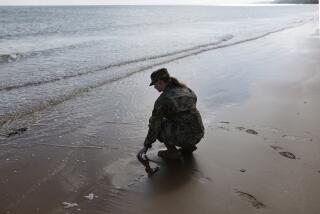Distant Remembrance : Far From Soviet Union, Red Army Veterans Commemorate the End of World War II
- Share via
Fifty years after Red Army soldiers stamped out the last sparks of German resistance in World War II, hundreds of aged warriors--their medals gleaming in the sun--gathered Tuesday for a last hurrah in a park in distant West Hollywood.
“We won’t have another rally like this one, even if we should live to the 60th or the 75th anniversary,” said Naum Sapozhnikov, president of the Los Angeles Assn. of World War II Veterans, a group of about 860 Red Army veterans. “Let it be a memorial for our children and our grandchildren.”
They came in uniforms and civilian clothes, some with grandchildren, others bearing photographs of loved ones who died in battles from Moscow to Berlin.
American World War II veterans were also supposed to take part in the anniversary celebration organized by the city of West Hollywood, but few, if any, were in evidence.
The Gold Star Mothers of California sent a delegation, and a color guard from Jefferson High School led a short parade along Santa Monica Boulevard to Plummer Park. An organization of gay, lesbian and bisexual U.S. armed forces veterans was also represented.
Most American veterans’ groups held their commemorations Monday.
For the Russian veterans, however, the idea of changing the traditional date for marking the victory in Europe was unthinkable.
Although the Western Allies announced Germany’s surrender May 8, 1945, Russian troops were still fighting on some fronts until the next day and May 9 has always been a sacred date in their former homeland.
Some of them were longtime residents of West Hollywood, where immigrants from the former Soviet Union make up about 13% of the population.
Others arrived more recently to join children and grandchildren who came before.
One of the latest arrivals--and the highest-ranking--was Gregory A. Mazin, 81, a retired major general of engineers resplendent in full dress uniform with red stripes down the trousers, gold leaf on the lapels and gold stars on the shoulder boards.
He flew in from Moscow to visit his daughter, a local resident, and brought his uniform for the occasion.
“A lot has changed since 1945, and not all for the best,” said Mazin, who remembers building a bridge over the Elbe together with American engineers when the two great armies met near Magdeburg, Germany, in the last days of the war.
“We worked together very nicely then, but the clean, pure peace we all wanted hasn’t happened yet,” he said.
Other veterans listened to Mazin respectfully, among them Roman Ayzenband, 71, whose 30 medals covered both sides of his suit jacket.
“God gave us the opportunity to survive the war and 50 years more. Many didn’t,” he said. “Front-line troops can’t forget their buddies. Nobody takes their place.”
*
Others in the crowd included a couple, Klara Krulewitch, 75, and Grigory Feldman, 78, who were married one year before the Soviet Union entered the war in the summer of 1941.
He went on to command chemical warfare troops, barely escaping encirclement by invading German forces, while she was an administrator for a front-line tank repair base. They came to America two years ago.
“There is no greater holiday,” Feldman said. “It left us alive and it saved the lives of millions of people--without this victory many more would have died.
More to Read
Sign up for Essential California
The most important California stories and recommendations in your inbox every morning.
You may occasionally receive promotional content from the Los Angeles Times.










